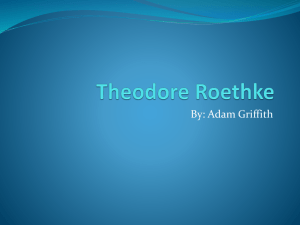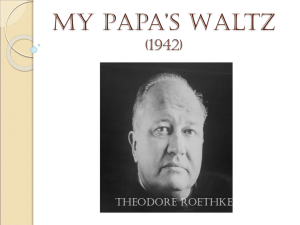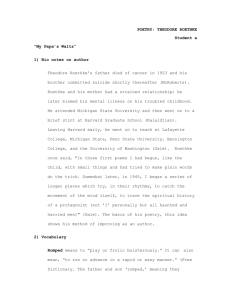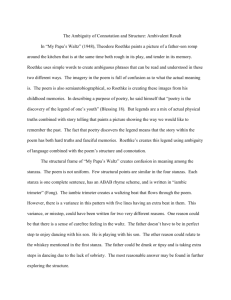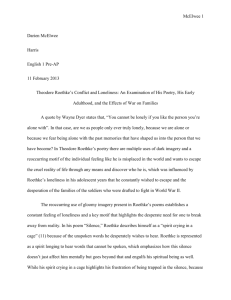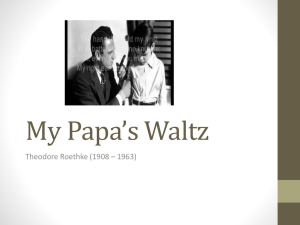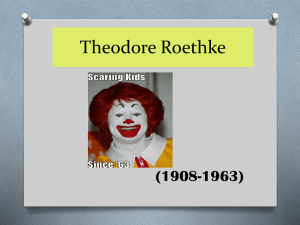File - Theodore Roethke
advertisement
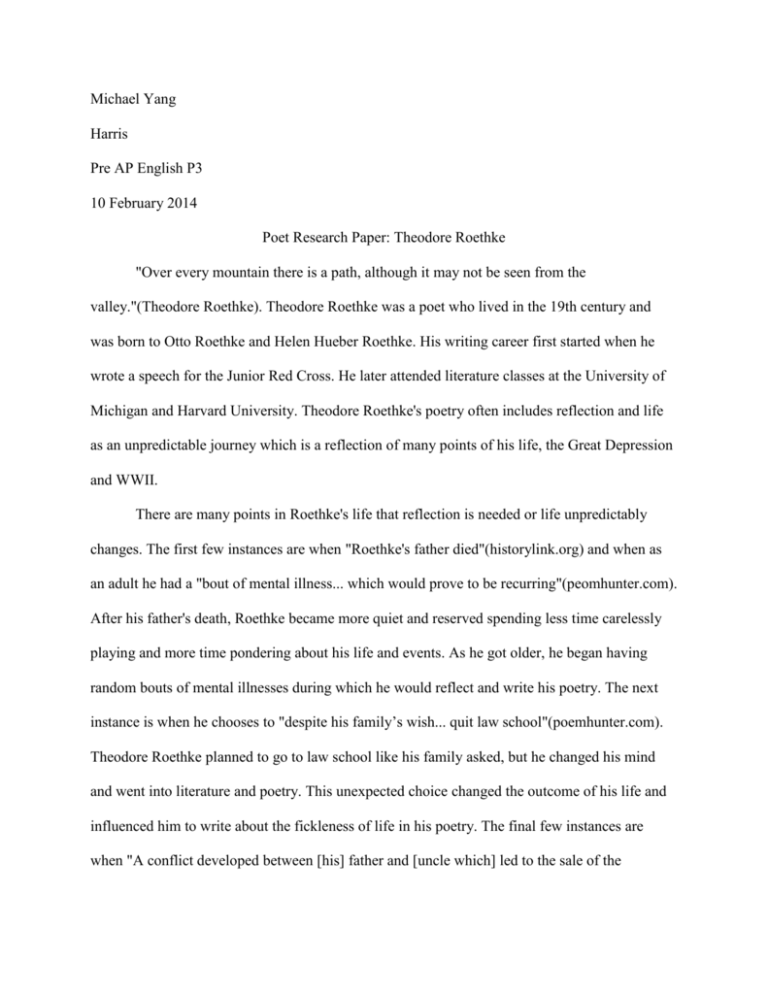
Michael Yang Harris Pre AP English P3 10 February 2014 Poet Research Paper: Theodore Roethke "Over every mountain there is a path, although it may not be seen from the valley."(Theodore Roethke). Theodore Roethke was a poet who lived in the 19th century and was born to Otto Roethke and Helen Hueber Roethke. His writing career first started when he wrote a speech for the Junior Red Cross. He later attended literature classes at the University of Michigan and Harvard University. Theodore Roethke's poetry often includes reflection and life as an unpredictable journey which is a reflection of many points of his life, the Great Depression and WWII. There are many points in Roethke's life that reflection is needed or life unpredictably changes. The first few instances are when "Roethke's father died"(historylink.org) and when as an adult he had a "bout of mental illness... which would prove to be recurring"(peomhunter.com). After his father's death, Roethke became more quiet and reserved spending less time carelessly playing and more time pondering about his life and events. As he got older, he began having random bouts of mental illnesses during which he would reflect and write his poetry. The next instance is when he chooses to "despite his family’s wish... quit law school"(poemhunter.com). Theodore Roethke planned to go to law school like his family asked, but he changed his mind and went into literature and poetry. This unexpected choice changed the outcome of his life and influenced him to write about the fickleness of life in his poetry. The final few instances are when "A conflict developed between [his] father and [uncle which] led to the sale of the Yang-2 greenhouses"(historylink.org) and subsequently his uncle "committed suicide"(historylink.org). The conflict between his father and uncle and the loss of the greenhouses was an unexpected event that changed Roethke’s life. The suicide of his uncle came unexpectedly and reinforced the idea that life has many unexpected twists and turns which he later wrote in his poetry. In Theodore Roethke's life many events happened that influenced his writing. When the "Great Depression hit Roethke had no choice but to leave"(poemhunter.com) his school. The Great Depression forced Roethke to change his plans for school and a career. Instead of finishing literature classes at Harvard, he was forced to go teach at Lafayette University. Another event that influenced Roethke was World War II "a conflict that [took] more lives and [destroyed] more land...than any other war"(history.com). World War II was a time of destruction and chaos, a time where the line between good and bad blurred. WWII influenced his writing by giving him an example of life's erratic nature and how things can quickly change from being peaceful to chaotic. WWII also influenced his poetry in another aspect, the death of "6 million Jews murdered in Nazi concentration camps"(history.com) taught him the importance of reflection when taking actions. The brutal and inhumane treatment of the Jews demonstrates what can happen when people only follow orders and do not reflect upon their actions. This inspired him to write about reflection in his poetry. Roethke's poetry contained many elements of imagery, symbols, theme, and figurative language that explained reflection and life as an unpredictable journey. The imagery of "a winding path"(12) in the poem "In a Dark Time" suggests that life is unpredictable. When thinking of a winding path, a long twisting and turning road can be envisioned. This can be compared to the journey of life because life is a long road that is unpredictable and changes all the time. The imagery of "a cave" (11) in "In a Dark Time" symbolizes reflection. A cave is a Yang-3 dark and secluded place where all is quiet and echoes can be heard if someone speaks. Those echoes represent the feedback you receive when you reflect on things, while the darkness represents the periods in life when reflection is most required. The personification of "the ravines ugly"(18) found in "Journey into the Interior" illustrates the unpredictable journey of life. The personification of the ravines as ugly can be related to how life can be unattractive, unpleasant, and ugly as exemplified by the suicide of his uncle. The ravines also represent the emotional scars that are left from life's unpredictable events which leave people feeling marred and unfixable. Theodore Roethke once said, "Once over every mountain there is a path, although it may not be seen from the valley"(Theodore Roethke). This quote unveils some of the themes of his poems which are reflection and life's unexpected twists and turns. His life was filled with many events that influenced him to write about what the quote reveals. The Great Depression, World War II, his father's and uncle's deaths and his mental illnesses were some of those events that influenced him. Theodore Roethke was a very popular poet in the mid nineteenth century who used his poetry to express his experience with the darker times of his life. Yang-4 Works Cited PBS. PBS, n.d. Web. 08 Feb. 2014. <http://www.pbs.org/wnet/ihas/poet/roethke.html>. Poet: Theodore Roethke - All Poems of Theodore Roethke. "Poet: Theodore Roethke - All Poems of Theodore Roethke." Poemhunter.com. N.p., n.d. Web. 06 Feb. 2014. <http://www.poemhunter.com/theodore-roethke/>. "Roethke, Theodore (1908-1963)." HistoryLink.org- the Free Online Encyclopedia of Washington State History. N.p., n.d. Web. 07 Feb. 2014. <http://www.historylink.org/index.cfm?DisplayPage=output.cfm&file_id=5410>. Roethke, Theodore. "In A Dark Time." Poemhunter.com. N.p., n.d. Web. 09 Feb. 2014. <http://www.poemhunter.com/poem/in-a-dark-time/>. Roethke, Theodore. "Journey Into The Interior." Poemhunter.com. N.p., n.d. Web. 07 Feb. 2014. <http://www.poemhunter.com/poem/journey-into-the-interior/>. "Theodore Roethke." : The Poetry Foundation. N.p., n.d. Web. 06 Feb. 2014. <http://www.poetryfoundation.org/bio/theodore-roethke>. "Theodore Roethke." Poets.org. Academy of American Poets, n.d. Web. 09 Feb. 2014. <http://www.poets.org/poet.php/prmPID/13>. "World War II." History.com. A&E Television Networks, n.d. Web. 07 Feb. 2014. <http://www.history.com/topics/world-war-ii>. "The Year 1921 News, Events, Technology and Popular Culture." What Happened in 1921 including Pop Culture, Events and Technology. N.p., n.d. Web. 09 Feb. 2014. <http://www.thepeoplehistory.com/1921.html>. Yang-5 "The Year 1923 News, Events, Technology and Popular Culture." What Happened in 1923 including Pop Culture, Events and Technology. N.p., n.d. Web. 07 Feb. 2014. <http://www.thepeoplehistory.com/1923.html>. "The Year 1929 News, Events, Technology and Popular Culture." What Happened in 1929 including Pop Culture, Technology and Events. N.p., n.d. Web. 09 Feb. 2014. <http://www.thepeoplehistory.com/1929.html>.
